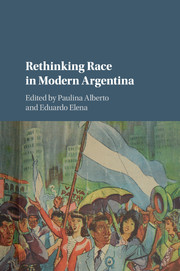Book contents
- Frontmatter
- Contents
- List of figures
- List of tables
- Notes on the contributors
- Preface
- Introduction: The shades of the nation
- PART I HISTORIES OF RACE IN THE TWENTIETH CENTURY
- 1 Insecure whiteness: Jews between civilization and barbarism, 1880s–1940s
- 2 People as landscape: The representation of the criollo Interior in early tourist literature in Argentina, 1920–30
- 3 Black in Buenos Aires: The transnational career of Oscar Alemán
- 4 La cocina criolla: A history of food and race in twentieth-century Argentina
- 5 “Invisible Indians,” “degenerate descendants”: Idiosyncrasies of mestizaje in Southern Patagonia
- 6 Race and class through the visual culture of Peronism
- 7 Argentina in black and white: Race, Peronism, and the color of politics, 1940s to the present
- PART II RACE AND NATION IN THE NEW CENTURY
- Epilogue: Whiteness and its discontents
- Collective bibliography
- Index
5 - “Invisible Indians,” “degenerate descendants”: Idiosyncrasies of mestizaje in Southern Patagonia
from PART I - HISTORIES OF RACE IN THE TWENTIETH CENTURY
Published online by Cambridge University Press: 05 March 2016
- Frontmatter
- Contents
- List of figures
- List of tables
- Notes on the contributors
- Preface
- Introduction: The shades of the nation
- PART I HISTORIES OF RACE IN THE TWENTIETH CENTURY
- 1 Insecure whiteness: Jews between civilization and barbarism, 1880s–1940s
- 2 People as landscape: The representation of the criollo Interior in early tourist literature in Argentina, 1920–30
- 3 Black in Buenos Aires: The transnational career of Oscar Alemán
- 4 La cocina criolla: A history of food and race in twentieth-century Argentina
- 5 “Invisible Indians,” “degenerate descendants”: Idiosyncrasies of mestizaje in Southern Patagonia
- 6 Race and class through the visual culture of Peronism
- 7 Argentina in black and white: Race, Peronism, and the color of politics, 1940s to the present
- PART II RACE AND NATION IN THE NEW CENTURY
- Epilogue: Whiteness and its discontents
- Collective bibliography
- Index
Summary
In Argentina's Southern Patagonian region one often hears that the Tehuelche people were the “only” and the “true Argentine Indians,” that they “became extinct [se extinguieron],” and that only a handful of “descendants” remain. Paradoxically, this utterance (“se extinguieron”) – in the passive voice, with no subject, in which there seems to be no agent responsible for the alleged extinction – takes place in a context of the re-emergence of the Tehuelche people and of an indigenous communitarian reorganization that involves the Tehuelche, as well as the Mapuche and Mapuche-Tehuelche. The supposed “disappearance” of the Tehuelche is the result of interrelated discourses and practices that a range of agents constructed and deployed over the course of more than a century, in which the ideology of “degenerative mestizaje” played a central role. In this chapter I argue that in the mid-twentieth century, the Argentine state, in its eagerness to “whiten” and homogenize its citizenry, suppressed the category mestizo (a term traditionally referring to people of mixed European and indigenous origins) from its bureaucratic terminology and replaced it with euphemisms – notably, the term descendiente [descendant] – that encompassed a range of interrelated racial, ethnic, class, and national classifications. Using a varied documentary corpus, this chapter analyzes the changing uses of classificatory terms like “mestizo” and “descendiente” over the course of the long twentieth century in what is today the province of Santa Cruz, in Southern Patagonia. In so doing, it sheds light on the tensions between those who had the power to classify and those who were classified, on the strategies used by the latter to enter or to exit taxonomic categories, and on the consequences of those categories in the daily lives of generations of local people who at different times acknowledged varying degrees of indigenous ancestry. Finally, this chapter contributes, from the perspective of Patagonia, to the emerging picture of the regional variations within Argentine ideologies of whiteness, and situates these regional and national ideologies within a broader Latin American context.
Latin American ideologies of mestizaje and whitening, as well as ideologies of racism, have varied widely across time and space, reflecting different patterns in the ways colonial and then national elites constructed hegemony and subalternity. As anthropologist Rita Segato argues, racial ideologies vary according to the particular “matrix of diversity” within every “national formation.”
- Type
- Chapter
- Information
- Rethinking Race in Modern Argentina , pp. 126 - 154Publisher: Cambridge University PressPrint publication year: 2016
- 8
- Cited by



